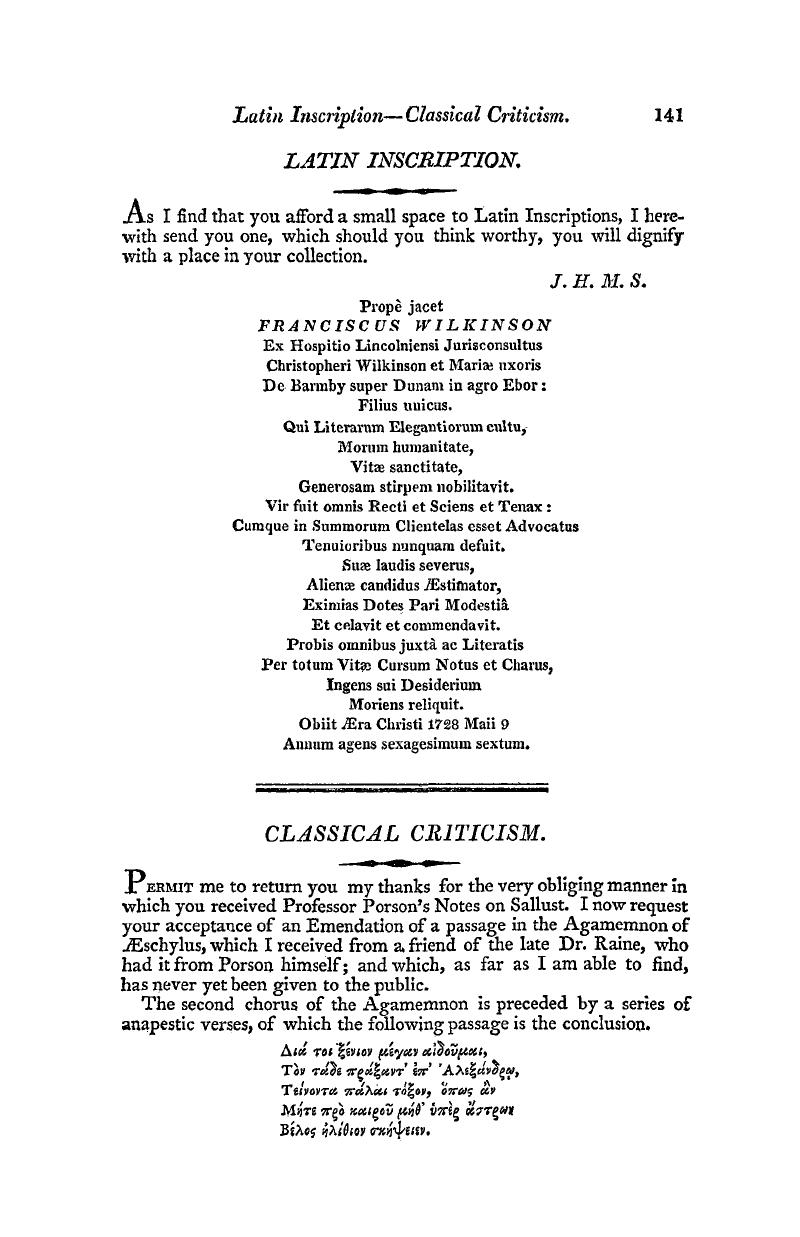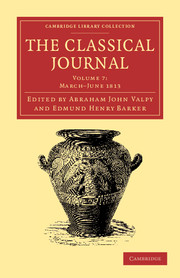Book contents
- Frontmatter
- Colophon
- Contents
- No. XIII
- INQUIRY into the Causes of the Diversity of Humau Character in various Ages, Nations, and Individuals, No. III [PROFESSOR SCOTT]
- Researches of the German Literati, on the subject of Ancient Literature and History, No. IV
- Latin Poem
- Observations on the “China of the Classics,”
- Critical Notice of Philemonis Lexicon
- Epigram on Cicero
- Latin Inscription
- Account of Herculaneum, extracted from Mr. Hayter's Report upon Hercul. MS. in a second Letter to H. R. H. the Prince Regent
- Biblical Criticism
- Prologus in Eunuchum ab alumnis Reg. Schol. Westm. actam A.D.1812
- Epilogus
- On the Ancient Language of Egypt
- Observations sur le Costume Théatral
- Latin Ode
- Biblical Criticism
- Explanation of a Passage in Virgil
- Classical Criticism
- A Sermon preached before the University of Cambridge, at St. Mary's, A. D. 1644. By John Pearson, A. M. Fellow of King's College, afterwards Lord Bishop of Chester. Never before printed
- Aristophanis Comœdiœ ex oplimis Exemplaribus emendatæ studio Rich. Franc. Phil. Brunck
- Reply to an Article on Bentley's Callimachus
- On the Existence of Troy
- Answer to the Defence of Sir W. Drummond concerning Egyptian Names
- On the Primary Meaning, the Use, and Etymology of Nubere
- Biblical Criticism
- Miscellaneous Observations on some Passages in several ancient and modern Authors. No. I
- Specimens of Persian Poetry, No. III
- On reading the Greek Testament in Public Schools
- Biblical Criticism
- Latin Inscription
- Classical Criticism
- On the Language of Action
- Account of an Extraordinary Sect called Yezidis
- On the Tyrian Inscription found in the Island of Malta
- Notice of St. Quentin's English and French Grammars
- Observations on the “Examination of a Criticism on Falconer's Strabo,”
- Singular Use of the word
- Extract of a Letter from Count Venceslas de Rzevuski to M. de Hammer
- On the Composition of the Greek Sapphic Ode
- In Tragicorum Græcorum Carmina Monostrophica Comnientarius
- Critical and Explanatory Notes on the Prometheus Desmotes of Æscbylus; with Strictures on the Glossary and the Notes to Mr. Blomfield's Edition, No. V
- On the Origin of the Druids, No. I
- Mr. Barker's Reply to the Strictures of the Scotish Review on his Edition of Cicero's Two Tracts
- On the Phœnician Inscription found in the Island of Malta
- Observations on Dr. Holmes's Preface, relative to the Syriac Version
- Biblical Synonyma
- Critical and Explanatory Notes on the Hippolytus Stephanephorus, with Strictures on some Remarks of Professor Monk, No. II
- Particulars relative to the Founders of the Druses Religion, collected from Arabian Authors
- Grammatica Græca suis partibus expieta et cxplicita ab Augusto Matthiæ
- Wherefore have the Ancients recorded a variety of men under the name of Zoroaster?
- Inscriptions found at Ancient Sagunturn
- Prospectuses of Works
- Literary Intelligence
- Notes to Correspondents
- No. XIV
Classical Criticism
from No. XIII
Published online by Cambridge University Press: 05 July 2015
- Frontmatter
- Colophon
- Contents
- No. XIII
- INQUIRY into the Causes of the Diversity of Humau Character in various Ages, Nations, and Individuals, No. III [PROFESSOR SCOTT]
- Researches of the German Literati, on the subject of Ancient Literature and History, No. IV
- Latin Poem
- Observations on the “China of the Classics,”
- Critical Notice of Philemonis Lexicon
- Epigram on Cicero
- Latin Inscription
- Account of Herculaneum, extracted from Mr. Hayter's Report upon Hercul. MS. in a second Letter to H. R. H. the Prince Regent
- Biblical Criticism
- Prologus in Eunuchum ab alumnis Reg. Schol. Westm. actam A.D.1812
- Epilogus
- On the Ancient Language of Egypt
- Observations sur le Costume Théatral
- Latin Ode
- Biblical Criticism
- Explanation of a Passage in Virgil
- Classical Criticism
- A Sermon preached before the University of Cambridge, at St. Mary's, A. D. 1644. By John Pearson, A. M. Fellow of King's College, afterwards Lord Bishop of Chester. Never before printed
- Aristophanis Comœdiœ ex oplimis Exemplaribus emendatæ studio Rich. Franc. Phil. Brunck
- Reply to an Article on Bentley's Callimachus
- On the Existence of Troy
- Answer to the Defence of Sir W. Drummond concerning Egyptian Names
- On the Primary Meaning, the Use, and Etymology of Nubere
- Biblical Criticism
- Miscellaneous Observations on some Passages in several ancient and modern Authors. No. I
- Specimens of Persian Poetry, No. III
- On reading the Greek Testament in Public Schools
- Biblical Criticism
- Latin Inscription
- Classical Criticism
- On the Language of Action
- Account of an Extraordinary Sect called Yezidis
- On the Tyrian Inscription found in the Island of Malta
- Notice of St. Quentin's English and French Grammars
- Observations on the “Examination of a Criticism on Falconer's Strabo,”
- Singular Use of the word
- Extract of a Letter from Count Venceslas de Rzevuski to M. de Hammer
- On the Composition of the Greek Sapphic Ode
- In Tragicorum Græcorum Carmina Monostrophica Comnientarius
- Critical and Explanatory Notes on the Prometheus Desmotes of Æscbylus; with Strictures on the Glossary and the Notes to Mr. Blomfield's Edition, No. V
- On the Origin of the Druids, No. I
- Mr. Barker's Reply to the Strictures of the Scotish Review on his Edition of Cicero's Two Tracts
- On the Phœnician Inscription found in the Island of Malta
- Observations on Dr. Holmes's Preface, relative to the Syriac Version
- Biblical Synonyma
- Critical and Explanatory Notes on the Hippolytus Stephanephorus, with Strictures on some Remarks of Professor Monk, No. II
- Particulars relative to the Founders of the Druses Religion, collected from Arabian Authors
- Grammatica Græca suis partibus expieta et cxplicita ab Augusto Matthiæ
- Wherefore have the Ancients recorded a variety of men under the name of Zoroaster?
- Inscriptions found at Ancient Sagunturn
- Prospectuses of Works
- Literary Intelligence
- Notes to Correspondents
- No. XIV
Summary

- Type
- Chapter
- Information
- The Classical Journal , pp. 141 - 142Publisher: Cambridge University PressPrint publication year: 2013First published in: 1813

